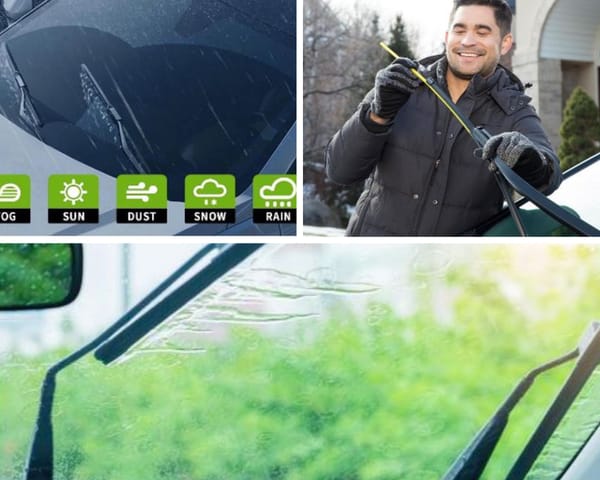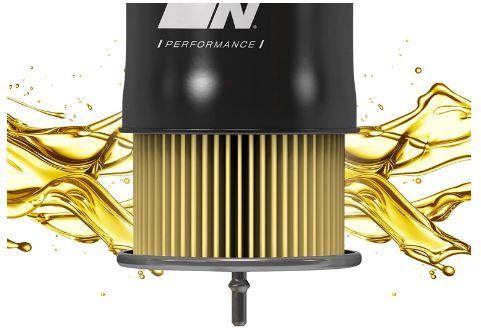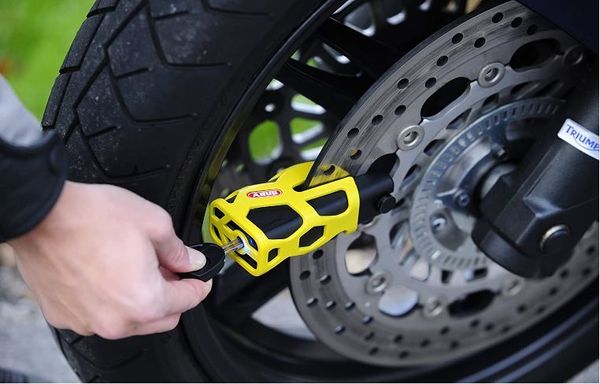Going green is an important part of being an environmentally conscious individual. One of the best ways to do this is to use energy-saving devices like an electric vehicle. In this article, I'm going to give you the best home EV chargers for your charging convenience. There are so many things to be concerned about when it comes to going green. These EV chargers are perfect for those who are looking for the convenience of charging their car at home and not having to drive to the charging station.
What is an Electric Vehicle (EV) charger?
An EV charger is designed to charge electric vehicles. The charging station can be installed at home or in the workplace and is typically plugged into an outlet. It is important to note that not all EV chargers are the same. Some chargers may charge vehicles at faster rates, while others may require more time. The best EV chargers for your home are those that are compatible with most vehicles. You should also consider the size of the charging station as well as the amount of time it takes to fully charge your vehicle. If you are looking for a quick charge, you should consider a fast charger. However, a fast charger is not always the best option. Many fast chargers are not compatible with most vehicles.
What points to know, before buying an EV charger?
Choosing to drive an electric vehicle (EV) is a significant step towards a more sustainable lifestyle. But owning an EV also means you'll need to think about how to charge it. Buying an EV charger may seem straightforward, but there are several factors to consider to ensure you choose the right one. Here are some essential points to know before buying an EV charger:
1. Know the Types of Charging
Understanding the types of charging is crucial. Level 1 charging uses a standard household outlet and offers slow charging speeds. Level 2 charging requires a dedicated circuit and provides faster charging times. DC Fast Charging stations are usually available in public places and offer the fastest charging option.
2. Understand the Types of Plugs and Connectors
Different EVs use different types of plugs and connectors. The J1772 plug is standard for all EVs sold in North America, except Tesla, which uses a proprietary connector. However, Tesla provides an adapter with each car for compatibility with J1772 stations.
3. Consider the Cable Length
The length of your charging cable can impact where you can park your EV while charging. A longer cable offers more flexibility but may also be more challenging to manage.
4. Indoor or Outdoor Installation
Depending on where you plan to install the EV charger, you need to consider whether it's designed for indoor or outdoor use. Outdoor-rated chargers are built to withstand various weather conditions.
5. Check Your Home's Electricity Supply
Before installing an EV charger at home, you need to ensure your home's electrical system can handle the additional load. You might need to upgrade your electrical panel, which can add to the installation cost.
6. Understand EV Electricity Rates
Electricity rates can vary based on the time of day and your electricity provider. Some providers offer lower rates during off-peak hours, which can save you money if you charge your EV overnight.
7. Consider the Charger's Power Level
Charger power levels can influence charging speed. A higher power level will charge your EV quicker but may require a more complex 48 amp charger installation process and higher upfront costs.
8. Look for Safety Certifications
When buying an EV charger, look for models that are UL-certified. UL certification indicates that the charger has been tested and meets specific safety standards.
9. Factor in Installation Costs
The cost of the EV charger itself is only part of the total cost. You also need to consider the price of installation, which can vary based on the complexity of the installation and the rates of local electricians.
10. Check for Rebates and Incentives
Some states offer rebates and incentives for installing an EV charger at home, which can significantly offset the cost. Be sure to check for any available programs in your area before making a purchase.
In conclusion, while buying an EV charger requires thoughtful consideration, it's a crucial investment for any EV owner. By understanding these key points, you can choose a charger that's right for your vehicle, your home, and your lifestyle.

What's the difference between level 1 & level 2 EV chargers?
Understanding the distinction between these two types of chargers is crucial for optimizing your charging routine and maximizing the benefits of your EV.
Level 1 and Level 2 chargers differ primarily in their power output and charging speed, with Level 2 chargers offering significantly faster charging times.
A Level 1 charger utilizes a standard 120-volt outlet, similar to a typical household outlet. This makes it the most accessible option as it requires no special equipment or installation. However, the trade-off is slower charging times and not much power. While convenient, Level 1 charging can take anywhere from 8 to 20 hours to fully charge an EV, depending on the vehicle's battery capacity.
On the other hand, a Level 2 charger requires a 240-volt outlet, similar to those used for large appliances like electric dryers. Because of the higher voltage, Level 2 chargers provide much faster charging times than Level 1 chargers. These Level 2 chargers can typically fully charge an EV in about 3-8 hours.
Due to the increased power output, Level 2 chargers require professional installation and a dedicated circuit. Despite the additional upfront costs, many EV owners find the investment worthwhile because of the convenience and
time-saving benefits.
Another key difference between Level 1 and Level 2 chargers is their suitability for different usage scenarios. Level 1 chargers, with their slower charging speeds, are ideal for overnight charging or for EVs that are driven less frequently. In contrast, Level 2 chargers are perfect for EVs that are used more regularly and need quicker charging times.
As EVs become more sophisticated and buyers want higher charging levels, level 1 will need to provide higher miles per hour, or change to a level 2 charging system.
How to install an EV charger?
The best home EV chargers are the ones that are visible and that are easy to understand. The most important thing to consider when shopping for an EV charging station is the voltage. The voltage is the measurement of how much power the charger needs to produce. It is important to find a charger that is compatible with your home’s power outlet. The charger should be able to produce the desired voltage and wattage. It is also important to pay attention to the amperage. The amperage is the measurement of how much electricity the charger can actually use. It is important to make sure that the charger is compatible with your home’s amperage.
Conclusion
The best home EV charging station for your charging convenience is one that delivers the required voltage and amperage for your vehicle with a long cable. Having ChargePoint Home Flex will assist in controlling the requirements you will need to have a successful charge.
It has a built-in protection circuit that will reduce the risk of overcharging and overcharging. It also has a green LED light that indicates that the charge is complete. There are also good EV chargers that are portable, so you can take them with you on the road.
Can we help? We've done the research for you and found the Best Home EV Charger on Amazon. Every day, we read hundreds of reviews and try the highest-rated products we have on our list.
Best Home EV Charger - Reviews
The Best
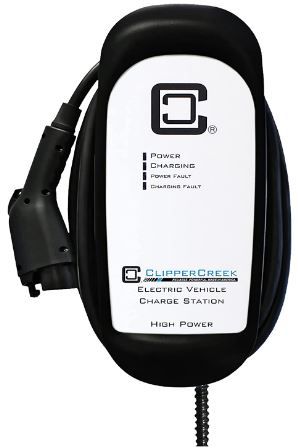
Product information
Enphase, previously known as ClipperCreek, is renowned for its award-winning technology found in every EV charger it produces - a testament to its industry-leading durability and reliability. Now, they have even further improved their products by offering a 5-year limited manufacturer warranty along with round-the-clock customer support. The HCS-40 hardwired home electric car charging station, which comes fully assembled, is designed for swift installation to a dedicated 40 Amp circuit by any licensed electrician.
The Enphase Level 2 EV chargers aren't just about reliability, but also safety. They are certified by ETL, an Independent Nationally Recognized Testing Laboratory, in compliance with the UL 2594 standards and have earned the ENERGY STAR certification. Originating from California, these commercial car charging stations are engineered to endure high-traffic use and a broad range of temperatures. They also feature fully sealed outdoor-ready NEMA 4 enclosures, protecting the internal components from weather elements.
When it comes to charging speed, the HCS-40 hardwired 240V 32 Amp Level 2 charger offers up to seven times faster charging than the standard Level 1 electric vehicle charger that comes with your EV. With a power capacity of 7.7kW, or up to 31 miles per hour of charging, you can rest assured that your EV or plug-in hybrid will be ready to hit the road after an overnight charge. Note that the HCS-40 requires a minimum 40 Amp dedicated circuit, and the miles per hour charge rate may vary based on your EV's make and model.
The HCS-40 isn't just a universal charger; it's specially designed for compatibility with all plug-in EVs sold in the USA. However, it performs best with vehicles having acceptance rates up to 7.7kW such as the Tesla Model 3, Jeep Wrangler 4xe, Kia Soul, and Hyundai Kona. Additionally, Enphase chargers qualify for state and federal rebates, offering you the chance to earn money back by charging your electric car at home.
Enphase has also ensured that the HCS-40 comes with all the essentials you need. It includes a robust and flexible 25-foot-long cable with a J1772 connector, allowing you to charge your plug-in even from the opposite side of the garage or in the driveway. The package also comes with a physical manual for easy pre or post-install reference. An integrated cable wrap and wall-mounted holster are also provided to help you neatly stow away your charger after use.

The price is a bit steep for what one gets. It doesn't work properly with the VW eGolf's delayed charging feature. The power cord should be longer.
Our Thoughts - With this product, plan the installation carefully.

Very Good
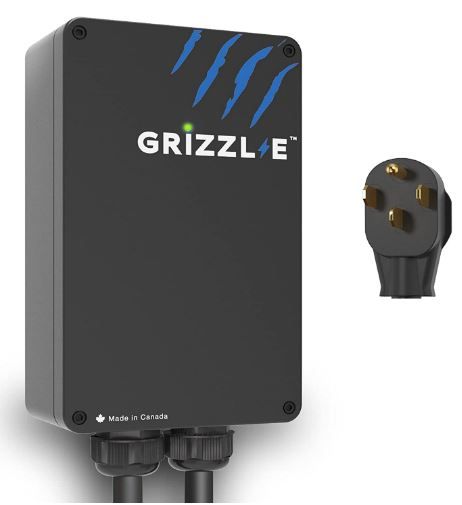
Product information
The Grizzl-E Classic NEMA 14-50 Plug with a 24 Feet Premium Cable is more than just an Electric Vehicle Charging Station. It's a versatile, robust, and mobile solution designed to meet all your EV charging needs. Perfectly suited for both regular and chilly weather conditions, it's compatible with every type of Electric Vehicle (EV) and Plug-in Hybrid Electric Vehicle (PHEV) available in North America. Its simplicity and power set it apart, making it an essential tool for any EV owner.
What makes the Grizzl-E Classic stand out is its commitment to safety and quality. It has undergone thorough testing and has received full certification from Underwriters Laboratories (UL), a globally recognized safety testing organization. Moreover, it's eligible for the Federal rebate program, adding an extra layer of financial benefit. The charging station boasts an impressive IP67 rating, making it water-resistant. Plus, it's fire-resistant and comes equipped with multiple protection features, such as Over Current, Over Voltage, Under Voltage, Missing Diode, Ground Fault, and Over Temperature Protections. It also incorporates self-monitoring and recovery mechanisms, along with Power Outage Recovery.
The Grizzl-E Classic doesn't compromise on speed either. It provides fast charging and adjustable amperage options: 40A, 32A, 24A, 16A. The maximum current output varies depending on the circuit breaker, offering 40 Amps for a 50A circuit breaker, 32 Amps for a 40A breaker, 24 Amps for a 30A breaker, or 16 Amps for a 20A breaker. This adjustability ensures efficient charging tailored to your specific needs. The charge rate ranges from 10-12 miles per hour at 16A to an impressive 28-30 miles per hour at 40A.
Ease of installation and use are other notable features of the Grizzl-E Classic. It allows you to save significantly on installation costs—all you need to do is install a simple 14-50R outlet, and your Grizzl-E is ready to go. Its design makes it easily transportable, and it can be swiftly removed from the mounting bracket for transportation between different locations. To top it all, it comes in a NEMA-4 water and air-tight metal enclosure, guaranteeing durability. With its exceptional power and varied output configurations, the Grizzl-E Classic offers unrivaled value for your money, making it a standout choice among charging stations.

Can be easily installed without much electrical know-how.

Product support needs improvement. A customer reported that mounting hardware was missing and waiting for a replacement.
Our Thoughts - A very good charger with many protection features.

Very Good
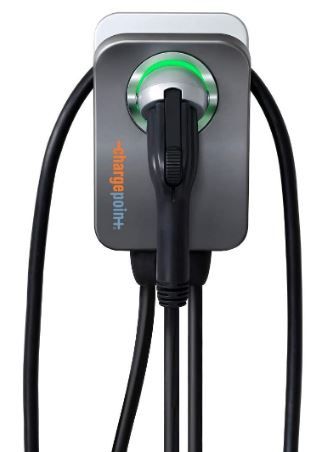
Product information
The Level 2, 240-volt outlet electric vehicle (EV) charging station revolutionizes the EV charging experience by offering charging speeds up to nine times faster than a standard wall outlet. Its versatility is showcased in its flexible amperage settings, ranging from 16 amps to 50 amps. Whether you prefer plug-in or hardwired installation, this charging station caters to your needs and preferences, making EV charging more accessible and efficient.
One of the standout features of this charging station is its universal compatibility. It works seamlessly with all-electric cars and has been rigorously tested on a wide range of leading EV models. Whether you drive a Chevrolet Volt, Hyundai Kona, Nissan LEAF, Tesla model, or any other electric vehicle, this charging station guarantees fast and reliable charging.
Enhance your EV charging with the ChargePoint home app's intelligent features. This smart app allows you to schedule your charging sessions during times when electricity rates are lowest, helping to save on energy costs. It also provides reminders to plug in your EV and offers Alexa voice control for a hands-free experience. Moreover, it consolidates all your ChargePoint Home Flex charging data in one convenient location, keeping you informed about your charging habits and patterns.
This charging station isn't just about speed and smart features; it's equally committed to safety and reliability. Backed by a 3-year warranty and round-the-clock customer support from a company with over a decade of experience in EV charging, you can charge your EV with peace of mind. The charging station is
UL-listed for electrical safety and has earned the ENERGY STAR certification for its energy efficiency, further testifying to its quality.
Installation of this charging station is a breeze for any electrician, indoors or out. If you opt for plug-in installation with a NEMA 6-50 or 14-50 outlet, you'll need circuits rated 40A or 50A. For circuit ratings outside of this range, including 60A-80A for 48A-50A charging, the plug can be easily removed for hardwired installation. This flexibility allows you to select the amperage that best suits your home, potentially saving you from costly electrical upgrades.

Customer support seems to be good. The app is really great for the information it gives.

Some chronic issues with Audi & VW charge ports. The cord should be longer.
Our Thoughts - This product seems to have some niggly issues but overall is a good charger. With ChargePoint Home Flex, you can adjust the current you want going into your EV.

Best Value
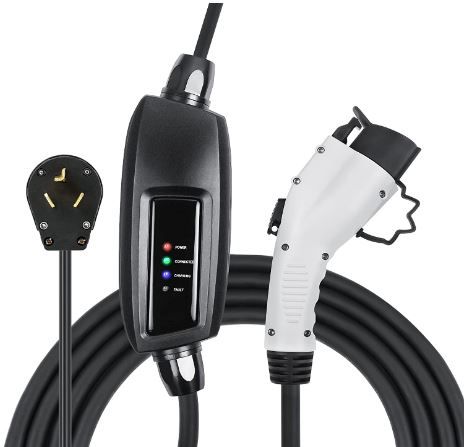
Product information
Experience the future of EV charging with our fast-charging solution designed to make the process as swift and effortless as possible. Our charging cable is built to be compact and resilient, making it an ideal choice for home use. The 21-foot cable length caters to most driveways or garages, ensuring easy access for charging. It uses the industry-standard J1772 charging protocol, enabling compatibility with all-electric cars and plug-in hybrids.
Our Level 2 charger takes your car charging experience up a notch by offering three times the charging speed of your car's original charger. Operating at 240V with up to 16A, it delivers a robust charging rate of 3.86kw/hour. This means you can expect approximately 11 miles of charge per hour, significantly reducing your vehicle's charging time and getting you back on the road quicker.
Quality is at the heart of our charging station. We've engineered it to be rugged and sturdy, capable of withstanding daily use. It's equipped with overvoltage, overheating, and overcurrent protection to ensure safe and efficient charging every time. The integrated indicating light provides visual cues about the different stages of charging and alerts you to any potential errors, keeping you informed throughout the charging process.
In terms of technical specifications, our charger has an input power of 240V AC and a voltage range from 185V AC to 264V AC. It operates at a frequency of 60Hz and a maximum current of 16A. The charger features a NEMA 10-30 plug and a cable length of 21ft (6.4m). It weighs in at 3.3kg (7.3lbs) and can operate in temperatures ranging from -30C (-22F) to 50C (+122F), making it a versatile addition to your EV charging setup.
We stand behind our products with the Electron 1-year warranty. If our product doesn't meet your expectations, we encourage you to contact us. We will strive to resolve the issue, and if we are unable to do so to your satisfaction, we guarantee a full refund or replacement - no questions asked. We value your trust in our products and aim to deliver the highest level of customer satisfaction.

It has safety precautions for overheating and overcharging. Good cord length.

The charging coupler is tight and difficult to plug and unplug.
Our Thoughts - For the price, this is a good charger that has many features.

Very Good
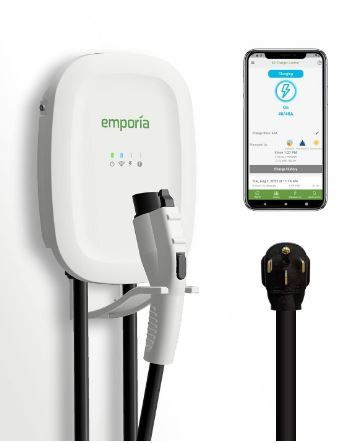
Product information
Introducing our Level 2 EV Charger, certified by UL and ENERGY STAR. This charger comes with a default charge rate of 40A, providing an efficient charging solution for your electric vehicle. However, to adjust the charge rate, a WiFi internet connection is required. The charger can be paired with an Emporia Vue Smart Home Energy Monitor, allowing you to optimize your energy use by charging only with surplus solar power and curbing charging during periods of peak demand.
Safety is central to our charger's design. It's been manufactured in line with the safety standards set out by NEC 625, SAE J1772, UL 817, UL 991, UL 2231, UL 2251, and UL 2594. Whether you choose to install it indoors or outdoors, this charger stands up to the elements with its rugged, watertight NEMA Type 4 enclosure. We recommend checking for any incentives or rebates available in your area from your local company or state. Furthermore, our charger comes with a 3-year warranty, offering you peace of mind.
Our EV charger offers flexibility in installation. You can either opt for hardwired installation or use a plug. It supports various power configurations: 11.5kW (240V/48A), 9.6kW (240V/40A), 10kW (208V/48A), or 8.3kW (208V/40A). If you're going for a hardwired installation or installing a NEMA Plug, we recommend hiring a professional electrician. For a 48A charge, a dual-pole, dedicated breaker at 60A+ is required, and for a 40A charge, a 50A+ breaker is needed.
Compatibility won't be an issue with our charger. It works with any EV thanks to the included SAE J1772 connector. Please note, that an adapter is required for Tesla EVs. The charger also comes with a 24-foot cable that features integrated cable management, making it convenient to use and store.
Our charger offers real-time energy data, providing you with insights into your energy consumption and charging sessions. To access this feature, a 2.4 GHz WiFi connection with internet access is required. You can monitor your energy usage and schedule charging sessions through the iPhone/Android/Web Browser app. This feature enables you to manage parameters effectively to cope with variable utility rate charges.

The Emporia unit works flawlessly and is a pleasure to use. The WIFI is great to have.

A customer reported that it doesn't charge his Chevy Bolt as the charging port doesn't engage properly.
Our Thoughts - A simple system that will power your vehicle very well. It's a great product for the money.

Good
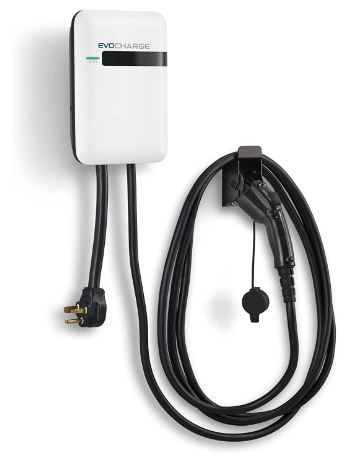
Product information
Our charger is designed to be a one-stop solution for all your EV and PHEV charging needs. It's fully compatible with every Electric Vehicle and Plug-in Hybrid Electric Vehicle sold in the United States and Canada. This includes popular models like the Chevy Bolt, Nissan Leaf, Ford Fusion, BMW i3, Chevy Volt, Toyota Prius, and even Tesla vehicles when used with an adapter.
Experience the speed of super-fast charging with our charger. It charges up to eight times faster than standard AC Level 1 EV chargers, adding an estimated 25-35 miles of range per hour. Beyond its impressive charging speed, our charger also boasts easy installation. It comes with a standard NEMA 6-50 plug and a universal mounting bracket, making the setup process straightforward and hassle-free.
Safety is paramount in our design and manufacturing process. Our charger has been meticulously designed and tested to meet the nationally recognized UL standards for safety in the USA and CUL standards in Canada. These certifications are crucial for any electrical product installed in your home. Moreover, our charger has a NEMA 4 rating, indicating its suitability for both indoor and outdoor use in any weather conditions.
With its adjustable amperage and sleek, compact design, our charger unit fits seamlessly into various settings. You can adjust the unit maximum current output to either 32A, 24A, or 16A to support circuit ratings of 40A, 30A, or 20A. The charger's slim, modern design allows for installation in multiple locations without intruding on your space.
Our goal is to provide you with everything you need in one package, eliminating the need for additional purchases. The package includes the charging unit with an 18-foot cable for extended reach, a NEMA 6-50 plug, a universal wall mounting bracket for easy installation, a plug holster for safekeeping, and a user manual to guide you through the setup and operation. All these come at one affordable price, offering exceptional value for your investment.

Easy installation and a very good charging system.

Customer support needs to be better. Some missing parts in the kit. The cord should be a bit longer.
Our Thoughts - A good product that will give fast charging.

FAQs
Is it worth charging the EV at home?
The answer, based on my extensive research, is a resounding yes. Here's why:
Firstly, charging your EV at home caters to the daily driving range needs of many EV owners. With Level 1, or Level 2 charging equipment, most drivers can fully charge their vehicles overnight, adding convenience and eliminating the need for additional costs associated with public charging stations.
Home charging also offers a level of reliability that public or workplace charging stations may not. As EV ownership continues to rise, the availability of public and workplace charging points could become increasingly scarce. Therefore, having a home charger ensures you always have a dependable charging source.
Moreover, installing an EV charging station can be a worthwhile investment, regardless of your driving habits or household size. Even for single-person households with one EV, the convenience and efficiency of home charging make it an appealing option.
From an economic perspective, charging your EV at home can be more cost-effective compared to public charging. While electricity rates can vary by region, charging at home, especially overnight when demand is lower, often results in savings. Furthermore, if your home runs on solar power, your charging costs could be significantly reduced, if not completely eliminated.
However, it's important to note that the initial cost of installing a home charging station can be considerable. Yet, the long-term benefits, including convenience, reliability, and potential savings, make it a worthwhile investment for many EV owners. Always remember, that safety is another crucial consideration, and charging at home with an EV home charger is generally safer.
Does a home EV charger add value to your house?
The short answer is: yes, it can.
According to a report by the U.S. Department of Energy, homes equipped with EV chargers can sell for 1-3% higher than similar properties without one. This increase in property value is reflective of the growing demand for sustainable living options and the convenience that home charging offers to EV owners.
However, it's important to note that the installation cost of an L2 charger, which is commonly used in residential settings, can be a significant investment. Despite this initial cost, many homeowners find the investment worthwhile, not only for the increased home value but also for the convenience and potential energy savings.
Opinions vary on this matter, and some argue that while smart home devices enhance living conditions, they don't necessarily add monetary value to the home. However, the increasing shift towards electric vehicles suggests that an EV charger could be an exception to this rule.
While the overall percentage of electric car usage is still relatively low, the market is rapidly expanding. Therefore, having a home equipped with an EV charger could appeal to a growing segment of homebuyers. A study by realtor.com showed that home listings in metro areas with the most EV charging stations were priced 1.5 times higher than surrounding ZIP codes.
The proximity to EV charging stations also seems to affect property values. A study published in Nature Sustainability shows that homes near EV charging stations experience a boost in property value. This suggests that the presence of an EV charger in a home could have a similar positive effect.
A UK study indicated that homes with a Level 2 charger sold for about 13% more than comparable homes without one. This substantial increase underscores the potential value that an EV charging station can add to your property.
What is the cheapest time to charge an electric car at home?
The answer, based on extensive research and expert advice, points towards off-peak hours.
Off-peak hours are periods when electricity demand is relatively low. During these times, electricity costs are often reduced, making it the most cost-effective time to charge your electric vehicle. These periods typically occur late in the evening, throughout the night, and continue into the early morning hours.
According to MCE Clean Energy, the best time to charge at home to save money and maximize the use of clean energy is between midnight and 3 PM. This timeframe aligns with off-peak hours and can significantly reduce your electricity bill.
The lowest time for electric power usage, which translates to the cheapest charging time, generally falls between 2:00 AM and 6:00 AM. Charging during this period not only offers economic benefits but also contributes positively to society and the grid by balancing out energy consumption.
However, it's important to note that peak demand hours can vary based on location and season. For instance, during hot summer months, the peak demand hour often occurs on a weekday afternoon, typically between 12 PM and 6 PM. Refraining from charging during these hours can lead to considerable savings.
If you're wondering about the cost implications, consider this: If electricity costs around ¢10.7 per kilowatt-hour, charging an EV with a 200-mile range (assuming a fully depleted 54 kWh battery) will cost about $6 to reach full charge during off-peak hours.
Overnight charging, particularly after 10 p.m., is often recommended due to lower demand for electricity. This approach not only saves money but also ensures your vehicle is ready for use the next day.



